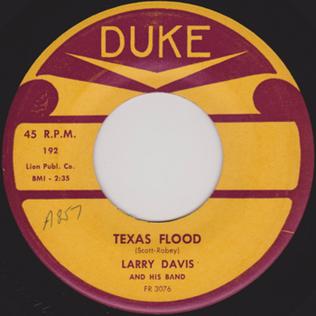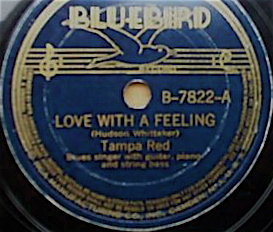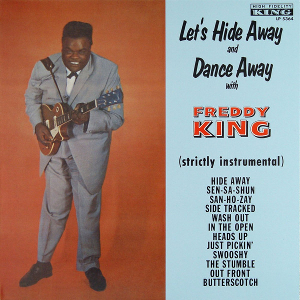
Slide guitar is a technique for playing the guitar that is often used in blues music. It involves playing a guitar while holding a hard object against the strings, creating the opportunity for glissando effects and deep vibratos which reflect characteristics of the human singing voice. It typically involves playing the guitar in the traditional position with the use of a slide fitted on one of the guitarist's fingers. The slide may be a metal or glass tube, such as the neck of a bottle. The term bottleneck was historically used to describe this type of playing. The strings are typically plucked while the slide is moved over the strings to change the pitch. The guitar may also be placed on the player's lap and played with a hand-held bar.

Stephen Ray Vaughan was an American musician, singer, songwriter, and record producer, best known as the guitarist and frontman of the blues rock band Double Trouble. Although his mainstream career only spanned seven years, he is considered to be one of the most iconic and influential musicians in the history of blues music, and one of the greatest guitarists of all time.
Texas blues is blues music from Texas. As a regional style, its original form was characterized by jazz and swing influences. Later examples are often closer to blues rock and Southern rock.

Albert Nelson, known by his stage name Albert King, was an American blues guitarist and singer whose playing influenced many other blues guitarists. He is perhaps best known for the popular and influential album Born Under a Bad Sign (1967) and its title track. He, B.B. King, and Freddie King, all unrelated, were known as the "Kings of the Blues." The left-handed King was known for his "deep, dramatic sound that was widely imitated by both blues and rock guitarists."

Fred King was an American blues guitarist, singer and songwriter. He is considered one of the "Three Kings of the Blues Guitar". Mostly known for his soulful and powerful voice and distinctive guitar playing, King had a major influence on electric blues music and on many later blues guitarists.

Jimmie Lawrence Vaughan is an American blues rock guitarist and singer based in Austin, Texas. He is the older brother of the late Texas blues guitarist Stevie Ray Vaughan.

Thursday Night in San Francisco is a blues album by Albert King, recorded live in 1968 at the Fillmore Auditorium. This album, together with Wednesday Night in San Francisco, contains leftovers recorded live on the same dates as Live Wire/Blues Power. Thursday Night in San Francisco, released in 1990, contains material recorded on June 27, 1968.

"The Stumble" is a blues guitar instrumental composed and recorded by American blues artist Freddie King, for his 1961 album Let's Hide Away and Dance Away with Freddy King. It was released as the fourth single from this album in 1962. It is considered a blues classic and follows in a string of popular instrumentals recorded by King in the early 1960s, including "Hide Away", "San-Ho-Zay", and "Sen-Sa-Shun".

"Texas Flood" is a blues song recorded by Larry Davis in 1958. Considered a blues standard, it has been recorded by several artists, including Stevie Ray Vaughan, who made it part of his repertoire.

In the Beginning is the second live album by Stevie (Ray) Vaughan and Double Trouble. While the album was released about two years after Vaughan's death in 1990, the actual performance took place on April 1, 1980 at Steamboat 1874 in Austin, Texas, and was broadcast live on KLBJ-FM radio. A 25-year-old Vaughan, still more than three years away from the release of his first studio album, performs with his "Double Trouble" bandmates: Chris Layton, drummer, and Jackie Newhouse, bassist.

"Hide Away" or "Hideaway" is a blues guitar instrumental that has become "a standard for countless blues and rock musicians performing today". First recorded in 1960 by Freddie King, the song became a hit on the record charts. It has been interpreted and recorded by numerous blues and other musicians and has been recognized by the Rock and Roll Hall of Fame and the Grammy Hall of Fame.
"Come On" is a song written by New Orleans rhythm and blues artist Earl King. He first recorded the song as "Darling Honey Angel Child" in 1960 for the Ace Records subsidiary Rex. Later that year, he recorded it as a two-part song for Imperial Records using some new lyrics. Retitled "Come On", it was released in 1960 with "Come On – Part I” as the A-side backed with “Come On – Part II”.

"The Sky Is Crying" is a blues standard written and initially recorded by Elmore James in 1959. Called "one of his most durable compositions", "The Sky Is Crying" became a R&B record chart hit and has been interpreted and recorded by numerous artists.

Live in NYC '97 is a live album by blues musician Johnny Winter, recorded at The Bottom Line in Manhattan. Additional recording took place at Studio 900, New York City.

Stevie Ray Vaughan was an American blues rock guitarist, singer, and songwriter, and the frontman for the band Double Trouble. During his career he released four studio albums, one live album, and several singles.

"You've Got to Love Her with a Feeling", or "Love with a Feeling" as it was originally titled, is a blues song first recorded by Tampa Red in 1938. Numerous blues artists have interpreted and recorded the song, making it a blues standard. When Freddie King adapted it in 1961, it became his first single to appear in the record charts.

Freddy King Sings is an album by blues singer and guitarist Freddie King. Released in 1961, it was King's first album and includes four singles that appeared in Billboard magazine's R&B and Pop charts. In 2008, Freddy King Sings was inducted into the Blues Foundation Hall of Fame in the "Classics of Blues Recordings" category.

Live at Montreux 1982 & 1985 is the fourth live album of American blues musician Stevie Ray Vaughan and his band Double Trouble, recorded at the Montreux Jazz Festival on July 17, 1982 and July 15, 1985, and released November 20, 2001 on Epic Records. Neither are complete concerts.

40 Blue Fingers, Freshly Packed and Ready to Serve is the debut studio album by the blues band Chicken Shack, released in 1968. The album reached number 12 in the UK Albums Chart.
"I'm Tore Down" or "Tore Down" is a blues song first recorded in 1961 by Freddie King for Federal Records. Pianist Sonny Thompson, who played on several early King songs, is credited as the songwriter. When Federal released it as single in 1961, with the instrumental "Sen-Sa-Shun" as the B-side, it reached number five on Billboard's Hot R&B Sides singles chart.
















